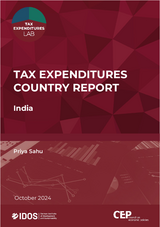Mitarbeiter sonstige
Tax Expenditures Country Report: India
Sahu, PriyaBooks, Mitarbeiter sonstige (2024)
Bonn: German Institute of Development and Sustainability (IDOS) & Council on Economic Policies (CEP)
DOI: https://doi.org/10.23661/cr2.2024
Tax policy ought to be not only efficient but also sufficiently transparent. This requires, inter alia, an elaborate analysis and explicit presentation of tax expenditures (TEs) and the specific policy goals the government is pursuing through them.
Transparency: India has been consistently publishing TE reports as part of its annual budget since 2006. However, the Global Tax Expenditures Transparency Index (GTETI) indicates that there is room for improvement, particularly in making these reports more accessible and comprehensive. The transparency score of 52.7 out of 100 reflects the need for better disclosure of policy objectives, more detailed benchmarks, and the inclusion of Goods and Services Tax (GST) exemptions in revenue forgone estimates.
Complex landscape: India's tax landscape is intricate, with various direct and indirect taxes administered by different bodies, such as the Central Board of Direct Taxes (CBDT) and the Central Board of Indirect Taxes and Customs (CBIC). The introduction of the GST in 2017 significantly transformed the indirect tax structure, subsuming multiple state and central levies. Despite these changes, the tax landscape remains complex, also in the context of managing and reporting TEs.
Fiscal sustainability: TEs represent a significant portion of India’s government spending. Careful management of TEs to ensure they do not undermine the country's fiscal health is thus critical. The historical trends indicate a reduction in TEs following the Global Financial Crisis (GFC) in 2007-2008 and the introduction of GST. However, the concessional tax regime introduced in 2019 led to an increase in revenue forgone, raising concerns about the long-term fiscal implications.
Policy recommendations: To enhance the effectiveness and transparency of TEs, the report offers several policy recommendations. These include:
• Improving transparency: Enhancing the clarity and accessibility of TE reports, particularly by including comprehensive information about GST exemptions, and providing clearer benchmarks and policy objectives for all TEs.
• Strengthening evaluation frameworks: Developing a robust framework for ex-ante and ex-post evaluation of TEs to assess their effectiveness in achieving the stated policy goal and further impacts on economic behaviour, social outcomes, and environmental objectives.
• Ensuring fiscal prudence: Carefully managing the scale of TEs to avoid compromising fiscal sustainability, particularly by phasing out ineffective or redundant incentives.
Contact
Cornelia Hornschild
Publication Coordinator
E-mail Cornelia.Hornschild@idos-research.de
Phone +49 (0)228 94927-135
Fax +49 (0)228 94927-130
Alexandra Fante
Librarian/ Open Access Coordinator
E-Mail Alexandra.Fante@idos-research.de
Telefon +49 (0)228 94927-321
Fax +49 (0)228 94927-130



![[Translate to English:] Photo: Alexandra Fante, Bibliothekarin/Open Access-Koordinatorin](/fileadmin/_processed_/f/0/csm__c_Deutsches-Institut-fuer-Entwicklungspolitik_Fante_94ce4fa1ba.jpg)